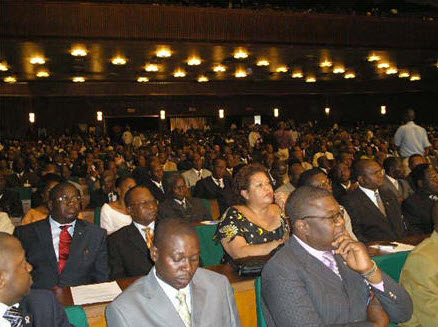On the 31st of July 2014, members of Collectif 24, supported by Internews and Albany Associates gathered in Kinshasa to evaluate the process of adopting a new law on access to information in the DRC. While access to information is a right guaranteed by the constitution, there is no specific law that safeguards and outlines specific provisions.
The adoption of this law would be a litmus test of sorts to gage the willingness within the DRC to move forward with democratic reform, giving citizens the means to hold the government to account while also giving them the power to participate, contest, propose and ultimately contribute to the country’s development.
The objectives of the workshop were to identify strategies on how to get the Senate Bureau to register the draft law on the agenda of the Senate for its session beginning in September 2014. The draft law was originally distributed to all the senators in March after having been submitted for their consideration by Senator Moïse Nyarugabo. However, it was never listed on the agenda because all draft laws first have to be defended by the submitting senator at the Conference of Presidents, which for that particularly session was only summoned once.
One of the observations made during the workshop was that unfortunately, the adoption of this law risked being defended along partisan lines, potentially endangering progress. Discussions led to a further observation that there was a negative perception of any law on the access to information by numerous political actors who perceive the project as a threat. In addition, it was noted that there has been a lack of engagement with the process by a number of civil society actors including religious organisations, human rights defenders and to a certain extent the media. This has exacerbated the perception that the law will be a political weapon against the government, while ways in which this law would benefit citizens beyond the political sphere have been underemphasised.
Given how crucial the acceptance of the project by the government is, the next steps will be to continue to engage with them and the Parliament in order for them to see the law’s benefits and to support its progress. In addition, expanded engagement with civil society actors will be a priority for the project to gain momentum and for ordinary Congolese citizens to have a stake in the success of the project.
Paul Nkuadio, Albany Associates Consultant in Kinshasa
